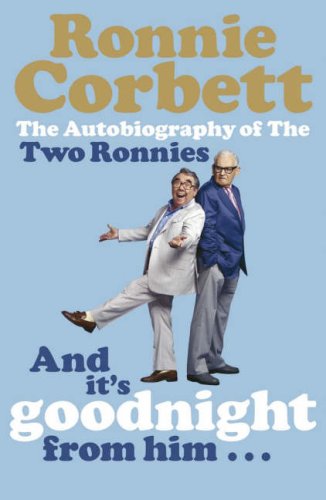- Date: 16.11.2007
- Book: And It's Goodnight from Him -: The Autobiography of the Two Ronnies
- Author: TCRH
Review
Much like Blockbusters before The A-Team on a Saturday night Ronnie Corbett's contribution to The Two Ronnies was to be endured rather than enjoyed.My conception of Corbett as an irritant in the shadow of Ronnie Barker's genius was not changed by my one and only meeting with him. Approaching him for an autograph, I was 12, the little man turned his back and walked off. It took the intervention of Jimmy Tarbuck to call Ronnie back.
If the gap toothed, Tory touting funster Tarby is more approachable than you then you are a little man with a big problem.
So I was somewhat soured to Corbett when I turned to this book. At times I did warm more to him when reading it. But there are faults with this book that ruin it both as a concept and as a read.
Firstly as an autobiography of Barker and Corbett the book fails because Barker, being dead, is unable to contribute. The book is skewed towards Corbett. Thus the less funny of the pair takes centre stage - a position which, you guess, he rather enjoys.
Secondly Corbett is not a comedian. He is an actor who reads other people's lines - more often than not without much flair. Unfortunately Corbett has chosen to try and replicate the style of one his monologues. This throws up the problem that many of his monologues weren't all that funny in the first place, that even when they were Corbett didn't write them and that they don't translate to the page (I know this because he quotes two of them in full but, strangely, doesn't grant any of Barkers monologues that privilege).
So we are left with a book that isn't what it claims to be, written in a style that consistently misses its targets. Even the help of David Nobbs, a doyen of comedy writing, can't save Corbett from himself. He is a golf club bore. If Peter Alliss finds you funny you're probably not all that great.
That said the book does pay tribute to Barker. Even if Corbett is loathe to admit that Ronnie B operated on a different plane he does enough to show just what Barker was capable of. And we are reminded just how uncomfortable that talent made him. From writing under the name of Gerald Wiley to inventing the newsreader persona to begin and end The Two Ronnies, Barker was scared of being himself.
Corbett didn't, and doesn't, share that problem. It's just that he doesn't come across as someone you actually want to know. Other than his monologues the only sketch quoted in full is the brilliant Mastermind take off. The sketch warrants the space but it is telling that Corbett has the punchlines. The 'Four Candles' sketch is glossed over and slagged off. But then that was Ronnie B's work.
From the BAFTA tribute to Barker we find that a hot buffet was served. From Barker's memorial service at Westminster Abbey we find that Corbett's speech got a wonderful round of applause. We don't really get any analysis of why Barker was so worthy of these tributes.
Barker comes across as such an unassuming person that you wonder why he bothered being friends with Corbett in the first place. Indeed it is telling that Barker's friendship with David Jason and his work with Richard Beckinsale is barely touched on. Maybe, during long, cold, sleepless nights, even Ronnie realises that he wasn't the best colleague Barker ever had.
As the story of a TV sketch show this book works. As a tribute to just how talented Barker was it fails. As an indication of Corbett's failings it works perfectly.
This should have been a tribute to a comic genius. Instead it becomes a monumental tribute to the universal problem of 'small man syndrome.'
Recent actions
-
toryah1988 has added Harry Potter And The Order Of The Phoenix to their read list.
-
toryah1988 has added Harry Potter And The Goblet Of Fire to their read list.
-
toryah1988 has added Atonement to their read list.
-
toryah1988 has added New Moon (The Twilight Saga) to their read list.
-
Monica has added The Da Vinci Code (Large Print) to their wish list.
